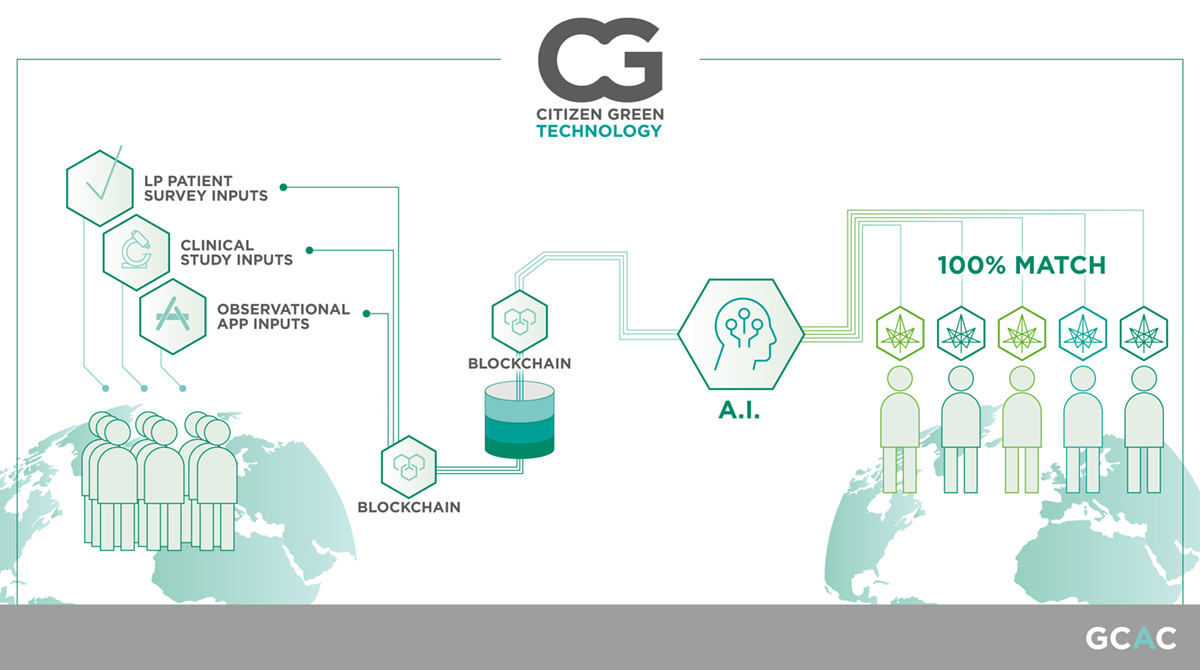Bradley Moore, CEO of GCAC discusses how artificial intelligence and blockchain (trusted data) solve the paradox of limited medical cannabis data and anecdotal user information
Jane Carter is an active young woman in her 30s who works as a software engineer, likes the outdoors and is planning to raise a family. Jane also has epilepsy.
As someone who has dealt with the condition her whole life, Jane is accustomed to maintaining control over her seizures. However, when her usual medication started to feel less effective, Jane confessed her concerns to a friend, who suggested medical cannabis as a potential treatment. Jane had never considered this possibility, but when she tried to learn more about it, she struggled to find trustworthy sources. Therefore, she turned to her physician, Dr Lisa.
Dr Lisa told Jane that although the benefits of cannabis have been discussed among doctors for a few years, she herself hadn’t yet seen any evidence from reputable studies showing clinical benefits of cannabis. The doctor explained that as a practitioner and a scientist, she liked to have solid evidence and clinical experience before she prescribed medication to her patients; therefore, she would not prescribe cannabis to treat Jane’s epilepsy.
Jane’s story is not unique and illustrates the medical cannabis paradox.
The medical cannabis paradox
The medical benefits of cannabis – including pain management, seizure remediation, muscle spasms management and others – have been well known for centuries. However, over the past century, cannabis has become a proscribed substance and treated as a law-enforcement challenge. As a result, it has become difficult for researchers to get approval and funding for properly controlled cannabis studies and users are unable, or unwilling, to share their experiences. Consequently, doctors and other practitioners lack trusted information on which to base clinical decisions.
Altogether, these factors have led to significant under-prescription of medical cannabis, there has been a large, unfilled demand for quality research, new product delivery methods and consumer information on the uses and effects of this substance.
The Citizen Green community
In an effort to bring together the global medical cannabis community and motivate its members – including patients, practitioners, scientists, cultivators and manufacturers – to share their knowledge of and experiences with medical cannabis, Global Cannabis Applications Corporation (GCAC) has developed the Citizen Green platform. This cutting-edge platform will facilitate the sharing of information between consumers, caregivers and researchers, as well as regulators and members of other industries, such as healthcare and cosmetics.
The Citizen Green platform is powered by the following technologies: CannaCube database, artificial intelligence (AI), mobile apps and blockchain.
AI, Chatbot and CannaCube
Artificial intelligence provides GCAC with the ability to bring to life all of the data collected and managed.
AI is used for multiple applications in our platform: chatbot, advanced analytics, predictive analysis and machine learning tools. And its capability to integrate observational and clinical research findings allows us to offer deeper insights and better outcomes for patients and the entire community.
The AI models the relationship between patients’ demographics and medical conditions, medical cannabis features and treatments effectiveness, thereby closing the loop between “pain and strain”. (TM pending)
Sanna, GCAC’s proprietary chatbot, facilitates stronger engagement with its adaptive user experience and personalised recommendations via our apps, CannaLife and Prescriptii. The chatbot will grow smarter over time as it will bridge missing information in users’ profiles.
CannaCube is GCAC’s medical cannabis database. Equipped with world-class data encryption and storage, this database curates ‘noisy’ data aggregated from CG apps, doctor references, social listening and various industry inputs against thousands of clinical study reports for validation and expansion of the data sets.
Mobile Apps
The client-facing components of Citizen Green are two easy-to-use mobile apps: CannaLife and Perscriptii. Connected by the CannaCube database, these apps collect and share 360-degree data relating to medical cannabis production, research, prescription and usage.
CannaLife is an app for networking, sharing peer-to peer-feedback and searching experiential user data related to cannabis consumption and consumer behaviour. Using screen capture technology, users can find information on medical cannabis, create a post and share it with other like-minded users. Then, when seeking information, users can call upon Citizen Green’s chatbot, Sanna, who, coupled with the world’s first cannabis-specific Google search engine, helps them find answers to specific health and cannabis queries.
Prescriptii is the first consumer-facing app for medical cannabis license holders. It takes users through an ailment-related questionnaire and based on CannaCube analysis, recommends the appropriate products to the condition described. An interactive map helps users to find nearby retailers that offer the recommended products.
Sanna, the chatbot, encourages users to evaluate their experience with the cannabis prescription. Fed back to CannaCube this information optimises further recommendations and can help patients and their practitioners to assess.
Blockchain
The GCAC blockchain gives medical cannabis users ownership over their data in a secure and encrypted environment. Unlike centralised applications, blockchain uses a distributed, decentralised digital ledger to record all transactions. GCAC recently released a White Paper discussing the digital token it is introducing on the blockchain to incentivise users.
How CannaLife Changed Jane’s Life
When Jane saw a news report about the CannaLife app, she was intrigued enough to install it and as she familiarised herself with the Citizen Green community, she found many stories from other epilepsy sufferers. This made her reconsider how cannabis might help her own condition.
Jane presented Dr Lisa with CannaLife, showing her the large database of anecdotal patient information, as well as research studies and manufacturers’ results. After reading a large number of consumer testimonials and some of the research, Dr Lisa felt confident enough to prescribe Jane a medical cannabis license, using the Prescriptii app as a guide. Three months later, Jane’s epilepsy symptoms had decreased considerably, and she very rarely had seizures.
As she works with Jane on her progress in Prescriptii, Dr Lisa is getting a feel for what other treatments work best with medical cannabis. She will definitely be using the app as part of her diagnostic toolkit going forward.
Jane, meanwhile, has returned to a much-improved quality of life. She is back to coding, rock-climbing and considering with her husband whether it is time to try for a baby.








